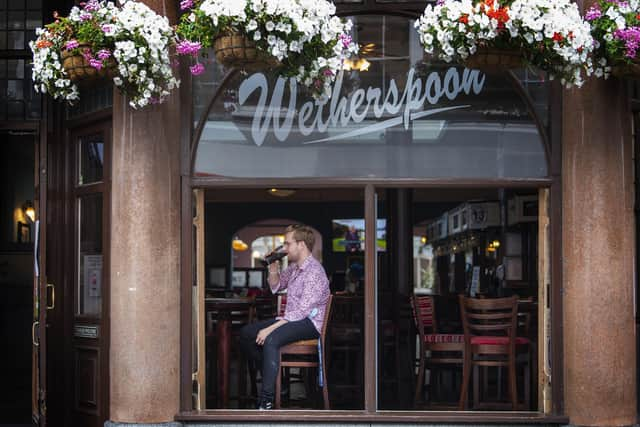Why Wetherspoon’s bounceback is something for the pub trade to raise a glass to - Jayne Dowle
Pub chain JD Wetherspoon, which prompted panicky headlines earlier this year when it announced a number of local pub closures, has bounced back to profit for the first time since the start of the coronavirus pandemic three years ago.
The company, set up in 1979 by pro-Brexit chairman Tim Martin, and known for its cheap beer prices and mega breakfasts, reported a pre-tax profit of almost £43m in the year to July 30.
Advertisement
Hide AdAdvertisement
Hide AdIt is the first time the pub chain has reported an annual profit since 2019, when it made profits of £102m. It had announced a £30m loss in previous results.


The company, which now runs about 826 pubs across the UK and Ireland, reports annual sales of £1.9bn, up 12.7 per cent in 12 months on a like-for-like basis, as cash-strapped consumers chose its relatively cheap food and drink over more expensive competitors.
I can happily put my hand up and say I’m one of them. Whilst some people are still inexplicably snobbish about ‘Spoons - and incidentally, many of its pubs are situated in outstanding historic buildings which otherwise might have fallen into rack and ruin - I’ve always flown the flag for its pub classics and deli deals.
When my children were small it was the one eating place I knew we would be greeted with kindness, and a couple of colouring books to boot, and there was always something on the menu to suit young appetites.
Advertisement
Hide AdAdvertisement
Hide AdOn a theatre trip to Blackpool this summer, my friend and I eschewed fancier alternatives and dived into The Albert and The Lion, the Wetherspoon pub near Blackpool Tower, named after a famous (but tragic) monologue written by Marriott Edgar and recited by 1930s comic Stanley Holloway, and enjoyed two pizzas, two glasses of wine and two G&Ts for about £30.
Everything was fresh and served with a smile. We both agreed we wouldn’t have found it cheaper anywhere else along the prom.
No wonder JD Wetherspoon’s food sales have soared by 16.7 per cent in a year. But it’s not the only aspect of the business that’s on the up. Bar sales increased by 9 per cent year on year, hotel room revenue increased by 11.8 per cent and sales for slot and fruit machine operations rose by 26.4 per cent.
And let’s toast the company’s staff ethos. The 42,000 people working for JD Wetherspoons received £36m in bonuses and share awards, of which 98.6 per cent was paid to staff below board level and 83.4 per cent was paid to staff working in pubs. This compares with £30m in its last financial year.
Advertisement
Hide AdAdvertisement
Hide AdI was disappointed last year when I learned that The Silkstone Inn, one of the two Wetherspoons pubs in Barnsley town centre, was earmarked for closure. However, whilst some may say that the dominance of the successful chain means other pubs can’t compete, there’s perhaps been an interesting precedent set in my own home town.
The Silkstone Inn has been taken over by an independent company, re-opening last month under the name of The Kestrel.
It took Wetherspoons to spot a gap in the market, which was to cater to an older crowd, many of whom like to pop in during the day for a coffee, a chat with friends and a read of the papers.
Amid so much High Street doom and gloom, it’s good to see a business responding to need; The Kestrel shows a full programme of sport on TV, offers a free dartboard and puts on Northern Soul music nights.
Advertisement
Hide AdAdvertisement
Hide AdIt’s often been said that the presence of a Wetherspoons, complete with cheap prices, diverts trade away from other establishments which can’t operate at such a scale and keep costs as low. However, it can also be argued that the presence of a Wetherspoons at least might be a strong factor in persuading people to leave the house and go out to the pub in the first place.
Whilst no scientific research exists to show how this might then encourage them to visit neighbouring bars and restaurants, it certainly helps prevent town and city centres from becoming moribund deserts.
So let’s raise a second glass and hope that this upward trajectory continues. Mr Martin says thus far, trading in JD Wetherspoon’s new financial year has been strong.
However, he sounds a strong note of caution about prospects for the next 12 months. Let us hope then, as all our ever-more precious pubs gear up for the party season, that his fears do not come to pass.
